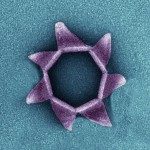In: G. Witzany (ed) Viruses: Essential Agents of Life, Springer Science+Business Media Dordrecht, Netherlands, pp 43-60
Three types of hypotheses have been proposed to explain the origin of viruses: the “virus first” hypothesis in which viruses originated before cells, the “regression hypothesis”, in which cells or proto-cells evolved into virions by regressive evolution and the “escape hypothesis”, in which fragments of cellular genomes (either from prokaryotes or eukaryotes) became infectious. We will try to show how accumulating data in structural biology combined to new virus definitions allow rejecting the first two hypotheses, favouring a new version of the escape hypothesis. The first viruses probably originated in a world of cells already harbouring ribosomes (ribocells), but well before the Last Universal Common Ancestor of modern cells (LUCA). Several viral lineages originated independently by transformation of ribocells into virocells (cells producing virions). Viral genomes originated from ancestral chromosomes of ribocells and virions from micro-compartments, nucleoprotein complexes or membrane vesicles present in ancient ribocells. Notably, this updated version of the escape hypothesis suggests a working program to tackle the
question of virus origin.


